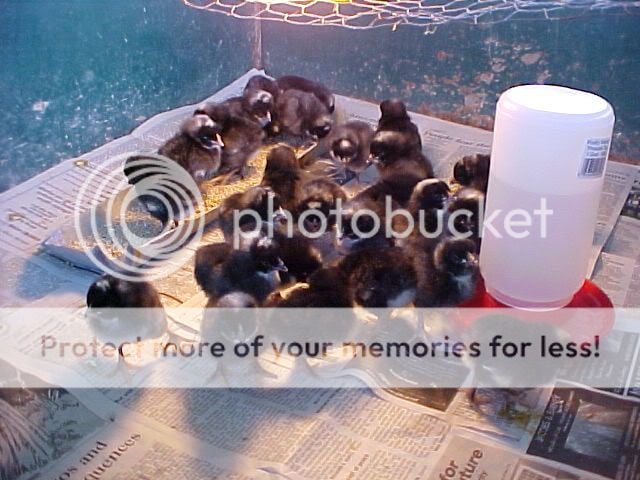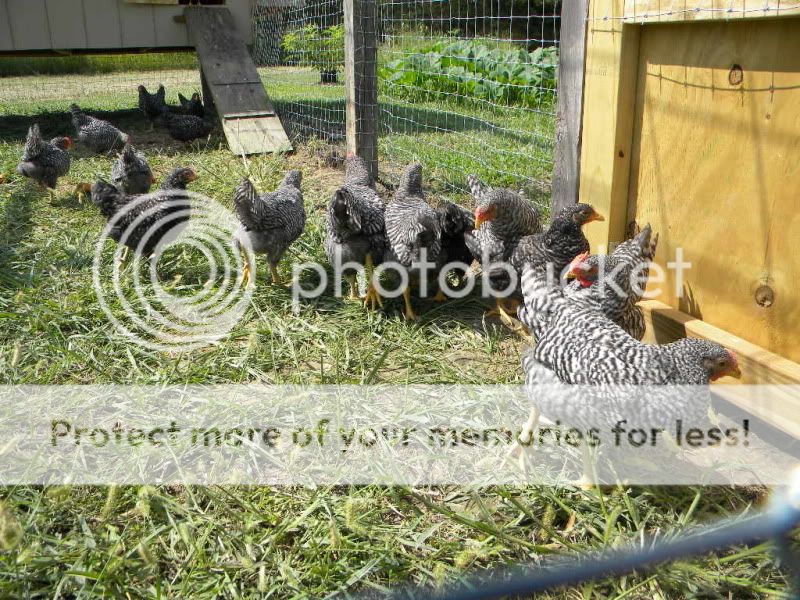I've been kinda watching the last few days of discussion and it got me to wonder, (slightly off topic) what is the availability of Dominiques in Washington State? I haven't looked much but it doesn't seem like there is much. Only have heard two other people who have them in my area, one who we ordered chicks with and a person looking for some new blood in his stock if we got a rooster.
Navigation
Install the app
How to install the app on iOS
Follow along with the video below to see how to install our site as a web app on your home screen.
Note: This feature may not be available in some browsers.
More options
You are using an out of date browser. It may not display this or other websites correctly.
You should upgrade or use an alternative browser.
You should upgrade or use an alternative browser.
Dominique Thread!
- Thread starter Dixiedoodle
- Start date
I've always been of the opinion that 4 eggs/week for a brooding type fowl is very good. My Silkies give 5-6 eggs/week but are so extremely broody that it cuts way into the yearly total but wonderful layers while they're laying! Now for non-broody types I would expect 6 eggs/week. My APA Amer started laying last Fall and is still producing 4-6 XL eggs/week. I'm looking forward to her first adult moult to give the poor thing a rest from laying so much - LOL!
For a bird that is as efficient as the Dominique, 150 eggs - is reasonable - and that assumes breaking up their broodiness. For a barnyard fowl, efficiency is as important as overall production. A foraging bird is a bird that is less expensive to maintain. Another Dominique virtue appears to be longevity with a surprising percentage of Dominiques aged three and over still active as layers.
What has really impressed me about The Keystone Koop is their superb egg quality. The shells are thick and strong, the whites and yolks stand up. I gave some to a friend who majored in animal science and knows how to judge and grade eggs. She told me that the Dominique eggs were quite literally the best she had ever eaten.
(The Keystone Koop is named after Mack Sennet's Keystone Studios comedic troupe, the Keystone Kops.)
- May 2, 2014
- 784
- 130
- 158
I have got to stop clicking on links just because they look interesting. Though they usually are interesting.
Here's todays find... being homozygous for a rose comb causes reduced fertility in the rooster. Your best producing rooster might carry an allele for a wild type comb (single comb) as he'd be heterozygous for the rose comb allele.
Well, except that there are two different alleles for the rose comb. R1 is the original, R2 is the second rose comb allele found. Test breeding shows that while R1R1 roosters have problems with fertility, R1R2 roosters do not!
http://www.plosgenetics.org/article/info:doi/10.1371/journal.pgen.1002775
Have fun reading, I just skimmed to the good parts
Here's todays find... being homozygous for a rose comb causes reduced fertility in the rooster. Your best producing rooster might carry an allele for a wild type comb (single comb) as he'd be heterozygous for the rose comb allele.
Well, except that there are two different alleles for the rose comb. R1 is the original, R2 is the second rose comb allele found. Test breeding shows that while R1R1 roosters have problems with fertility, R1R2 roosters do not!
http://www.plosgenetics.org/article/info:doi/10.1371/journal.pgen.1002775
Have fun reading, I just skimmed to the good parts

- Mar 10, 2010
- 160
- 125
- 193
. I have 6 year old hens, 2 that I still use in breeding pens that still lay well. Also have you contacted your Club regional coordinator for availability of LF Doms? As for rosecomb and fertility I culled any single combs out of my flock years ago and have never had a fertility problem. One Cock is three years old and his cousin who is in the pictures I posted earlier just hatched all four eggs that were set under her.For a bird that is as efficient as the Dominique, 150 eggs - is reasonable - and that assumes breaking up their broodiness. For a barnyard fowl, efficiency is as important as overall production. A foraging bird is a bird that is less expensive to maintain. Another Dominique virtue appears to be longevity with a surprising percentage of Dominiques aged three and over still active as layers.
What has really impressed me about The Keystone Koop is their superb egg quality. The shells are thick and strong, the whites and yolks stand up. I gave some to a friend who majored in animal science and knows how to judge and grade eggs. She told me that the Dominique eggs were quite literally the best she had ever eaten.
(The Keystone Koop is named after Mack Sennet's Keystone Studios comedic troupe, the Keystone Kops.)
Last edited:
These are the 10 week rose comb.




The other 3 are the aprox 5/6 week old single comb. chicks and they are way friendlier than the rose comb chicks, al 4 have set on my knee and slep today. None of my 70 + chicks have been this friendly.
The Question i have is about single and double cones, i bought 5 DOMs from a feed store, all are double cone, i took 4 more from a person that was not allowed to keep them, should i get rid of the single come chicks or just separate them later when they get grown?
The other 3 are the aprox 5/6 week old single comb. chicks and they are way friendlier than the rose comb chicks, al 4 have set on my knee and slep today. None of my 70 + chicks have been this friendly.
The Question i have is about single and double cones, i bought 5 DOMs from a feed store, all are double cone, i took 4 more from a person that was not allowed to keep them, should i get rid of the single come chicks or just separate them later when they get grown?
Last edited:
WOW they sure are pretty!Here's some pics of mine. Got them last summer, slowly worked my day down to one roo and eight hens. Gave away a few hens to a friend, lots of roos went in the pot. Got to pull some eggs out to hatch some chicks soon. Pics are a few days old, 7 week old last summer, and this winter during a snow storm. Need to take a pic of my last rooster, he's turned out really handsome, definitely cock of the walk! Only problem, when I got rid of all his competition he got mean, he keeps attacking my boots when I go in the coop!



Feed Question:
Is there any harm in feeding Dominique chicks a higher protein starter? My early summer chick order will be here Monday and will include 4 Doms and 2 Buckeyes. The Buckeyes seem to need a higher protein than 18% to reach potential and I don't want to brood separately if I don't have too. I was going to feed Gambird Starter (24% protein) or Farmer's Helper Ultra Kibble (32.25% protein). Ideas on this? Any help appreciated. First time with either breed, so I want to make sure they get a good early start.
Is there any harm in feeding Dominique chicks a higher protein starter? My early summer chick order will be here Monday and will include 4 Doms and 2 Buckeyes. The Buckeyes seem to need a higher protein than 18% to reach potential and I don't want to brood separately if I don't have too. I was going to feed Gambird Starter (24% protein) or Farmer's Helper Ultra Kibble (32.25% protein). Ideas on this? Any help appreciated. First time with either breed, so I want to make sure they get a good early start.
I'd go w/ the 24%. I did that last year, and my 5 girls started laying at 16.5-17 weeks. (EE, RIR, BSL) IMO, the standard fare is the bare minimum in nutrients to get the birds to POL.
Watch total calorie count; the point of grower feed is to slowly grow them to puberty so their bodies have time to fully develop before they start to low. Most grower rations are lower in protein than starter feed. Some feed companies, such as Purina, offer a combined chick/grower ration that is followed with a layer ration.
- Nov 28, 2010
- 757
- 68
- 168
Topdog: I'm guessing you meant single and rose comb? I've never had a purebred Dominique with a single comb, but I have heard they happen occasionally. I've also been told that single comb Dominique hens lay every bit as well as their correct rose combed sisters. I have also heard that the single comb cockerels are delicious, though I have no personal experience with that either. Since they're from a different source, if all the new chicks have a single comb, they might be barred Plymouth Rocks or Marans which are another popular barred breed. What color are their legs?
Clucknbell: Around here, the higher protein Purina Gamebird starter with animal based protein costs a whole $2.30 more a bag, and for the extra expense, I've found the birds feather out and grow faster. That's not a big deal if you have a few chicks, but can make a world of difference if you're raising several dozen and would like them out of the brooder pens ASAP.
 They will also do fine on Purina Flock Raiser or chick starter Crumbles (both all vegetable protein), but if you can supplement with some animal protein, so much the better.
They will also do fine on Purina Flock Raiser or chick starter Crumbles (both all vegetable protein), but if you can supplement with some animal protein, so much the better.
Clucknbell: Around here, the higher protein Purina Gamebird starter with animal based protein costs a whole $2.30 more a bag, and for the extra expense, I've found the birds feather out and grow faster. That's not a big deal if you have a few chicks, but can make a world of difference if you're raising several dozen and would like them out of the brooder pens ASAP.

New posts New threads Active threads
-
Latest threads
-
Dog attack on my chicken
- Started by Marcher01
- Replies: 2
-
Head twitching/stopped laying/face swollen
- Started by Lamb770
- Replies: 0
-
A round of dewormer for everyone!?!
- Started by Artsy_Teacher
- Replies: 0
-
-
-
-
Threads with more replies in the last 15 days
-
-
-
-
-
BYC's 52-week Photography Challenge. Week 1: (Jan 5-11, 2026). Theme: SUNSET
- Started by azurbanclucker
- Replies: 83
-
×




